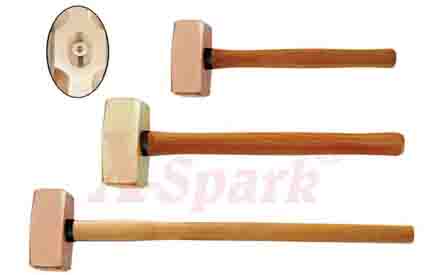The explosion-proof tools are also called non-sparking tools. The material of explosion-proof tools is copper alloy. Due to the good thermal conductivity of copper and the characteristics of almost no carbon, the heat generated in a short time when the tool and the object are rubbed or impacted is absorbed and conducted. Another reason is that copper itself is relatively high. It is soft, has a good retreat during friction and impact, and is not easy to produce tiny metal particles, so we can hardly see sparks.
After using it in our daily work, the explosion-proof tools should have a proper maintenance stage, which is very important for the life of the tools. If the explosion-proof tools are not properly maintained, it will not serve us for a long time.
After we finish using the explosion-proof hammer, its proper maintenance plays a very important role in the life of the tool:
1. First of all, we must store the tools in a dry place. This is to prevent some parts of the work from being damaged.

2. In our daily work, the surface attachments of the tool should be treated after 20 consecutive taps, and then use after cleaning. Never use it continuously, lest the tool will be heated due to friction for a long time. It may damage our tool products.
3. After use, wipe off the dirt and deposits on the surface and store it in a dry and safe place.
4. Percussion tool products should not be hit continuously. There should be a suitable interval for more than ten times. At the same time, the debris attached to the product part should be removed in time before continuing to use it.
5. Wrench products cannot be used excessively, not to mention the use of casing or other metal rods to extend the arm of force, and the method of tapping with a hammer (except for tapping wrenches) to turn fasteners.
6. Cutting edge tools should be placed in the sink and lightly touch the grinding wheel for sharpening. Do not use excessive force and contact the grinding wheel for too long.
7. In the actual operation of hammering tools, the debris on the site and the oxide corroded on the working surface must be removed to prevent the third party from hitting.
According to the above performance and use, it shows that aluminum-copper alloys are more suitable for atmospheric equipment and environments with less stringent requirements on explosion-proof conditions (such as gas stations, small oil depots, etc.) during normal use. The applicability of the performance of beryllium copper alloy explosion-proof tools (such as oil refineries, gas transfer stations, gas production plants, drilling crews, etc.).
8. All kinds of explosion-proof tools are carefully operated before and after use, handle with care, and cannot be thrown on the rock or cement floor.
9. When percussion tools are used in rock operations, the workplaces they touch must be immersed in water before they can be operated.
10. Before using various products, clean the surface oil stains, and use the steel tools according to the instructions.
We're explosion-proof tools manufacturers. If you are interested in our products, please feel free to contact us.